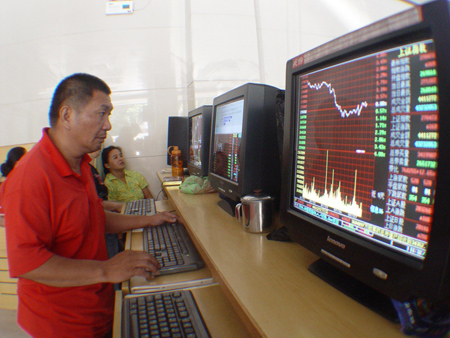Train crash hits stocks
Updated: 2011-08-01 09:19
By Chen Jia (China Daily)
|
|||||||||||
|
 |
|
An investor watching the Shanghai Composite Index falling on a terminal at a securities trading office in Haikou, capital of South China's Hainan province. The index dropped 2.96 percent to 2,688.75 at the close on July 25. [Photo / China Daily] |
The high-speed train crash on July 23 and consequent public fury led to a rout of related stocks listed in China and overseas markets, which may cast a shadow over train-making and railway technology companies in the coming months.
The true causes of the accident in Wenzhou, in East China's Zhejiang province, are expected to influence investors' decisions and the movement of stock prices. The authorities are being urged to disclose more information soon, analysts said. Many of the experts believed that China's high-speed rail construction may slow down in the short term.
China's stocks fell last week, a biggest weekly decline in two months, amid investors' worries over the fatal accident, which was the most serious blow yet to the country's burgeoning high-speed rail ambitions.
Xinhua News Agency reported on Friday that the number killed increased to 40 from the first figure of 35 after a high-speed train crashed into the rear of a stalled one on a viaduct near Wenzhou.
On the first working day after the train crush, July 25, the Shanghai Composite Index dropped 2.96 percent to 2688.75 at the close. It was the biggest one-day fall in nearly three months. Stock prices of the China South Locomotive & Rolling Stock Co Ltd - the high-speed train supplier - declined by 13.96 percent to 5.85 yuan a share on the day.
Premier Wen Jiabao went to Wenzhou last Wednesday and ordered a swift and transparent probe into the accident. A special investigation team has started work and hopes to publish its findings before the end of September.
However, many victims' families and the public say they have been given few details about the crash. They accuse the rail authorities of not checking the accident site adequately before suspending rescue efforts.
Last week, the Shanghai Composite fell 2.6 percent, the most since the week ending May 27. Shares in China Railway Construction Corp, the major company involved in the construction of China's railway projects, fell to a record low since its trading debut at the close on Friday.
"The big shock may slow down the construction of high-speed rail, because it takes time to improve the relevant technology and safety management," said Chu Hai, an industrial analyst at Ping An Insurance (Group) Co Ltd.
Zhu said people may now opt to take a flight rather than a high-speed rail link over the next few months, which will affect revenues in the rail sector.
Stephen Green, an economist with Standard Chartered PLC in Shanghai, said that, given the train crash, huge investments and heavy debts, the Ministry of Railways may have financing difficulties and increased pressure on interest payments in the future.
"The pace of investment could slow," said Green, although the ministry is still planning to extend the rail network by another 30 percent over the next five years.